From accession in 1965 to the Presidency in 2025, Malta and the Council of Europe have forged a strong relationship based on the shared values of Democracy, Human Rights and the Rule of Law. Discover the key milestones that have defined this journey and shaped Malta’s role within the organisation.
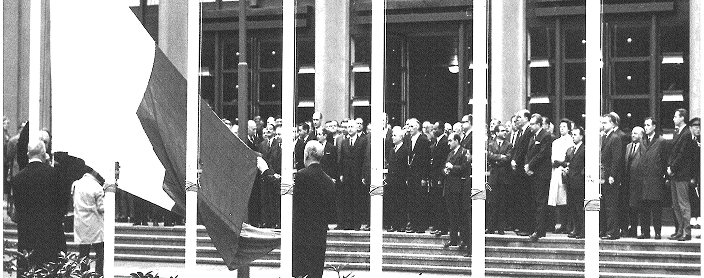 Malta officially accedes to the Council of Europe as the 18th Member State, just a few months after securing independence, marking a clear commitment to uphold the principles of human rights, democracy and the rule of law from the very outset of its European journey.
Malta officially accedes to the Council of Europe as the 18th Member State, just a few months after securing independence, marking a clear commitment to uphold the principles of human rights, democracy and the rule of law from the very outset of its European journey.
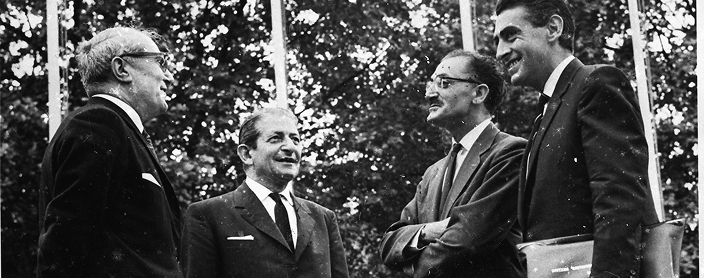 The Maltese flag is hoisted in front of the Palais de l’Europe for the first time, in the presence of former Prime Minister, Dr George Borg Olivier.
The Maltese flag is hoisted in front of the Palais de l’Europe for the first time, in the presence of former Prime Minister, Dr George Borg Olivier.
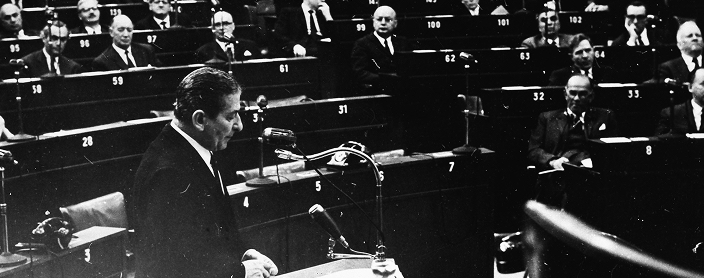 Dr George Borg Olivier, former Prime Minister, highlights Malta’s accession as a natural return to the European family after a period of absence.
Dr George Borg Olivier, former Prime Minister, highlights Malta’s accession as a natural return to the European family after a period of absence.
Malta signs the European Convention on Human Rights and later ratifies it on 23 January 1967, marking a decisive step in safeguarding human rights and fundamental freedoms.
1966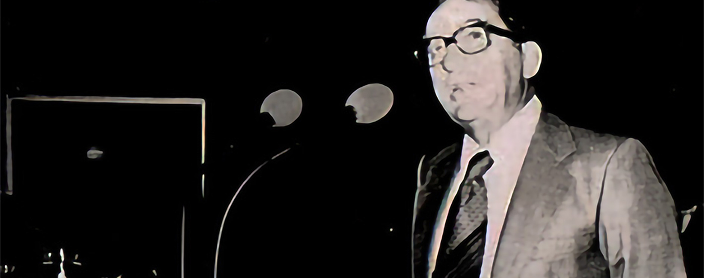 Mr Dom Mintoff, former Prime Minister, addresses the Parliamentary Assembly as Chair of the Committee of Ministers, advocating for an earnest dialogue with Mediterranean countries.
Mr Dom Mintoff, former Prime Minister, addresses the Parliamentary Assembly as Chair of the Committee of Ministers, advocating for an earnest dialogue with Mediterranean countries.
On the 23rd of November, Malta presides over the 63rd session of the Committee of Ministers, welcoming the Principality of Liechtenstein as the 21st member of the Council of Europe and endorsing of a declaration reaffirming the organisation’s dedication in the fight against terrorism.
1978On the 16th of November, Malta chairs the 83rd Session on the Committee of Ministers, which includes the accession of the Republic of San Marino as the organisation’s 22nd Member State, and a declaration setting out future guidelines to ensure equality between men and women, among others.
1988Malta joins the North-South Centre as a founding member, reinforcing its commitment to cooperation, solidarity, and global interdependence.
1989 The European Convention for the Protection of the Archaeological Heritage, commonly known as the Valletta Convention, replaces the London Convention of 1968 to reflect the evolving threats to archaeological heritage, particularly those posed by large-scale construction projects across Europe. The revised text emphasises the conservation and enhancement of archaeological heritage as an objective of urban and regional planning policies.
The European Convention for the Protection of the Archaeological Heritage, commonly known as the Valletta Convention, replaces the London Convention of 1968 to reflect the evolving threats to archaeological heritage, particularly those posed by large-scale construction projects across Europe. The revised text emphasises the conservation and enhancement of archaeological heritage as an objective of urban and regional planning policies.
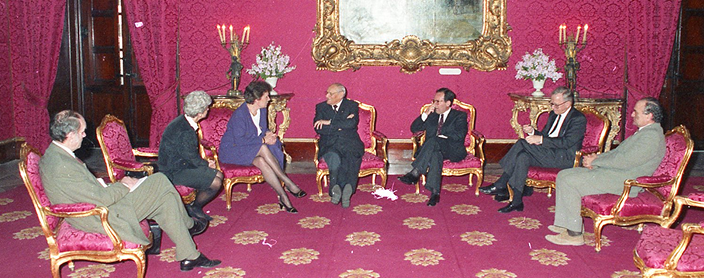 For the first time, Malta hosts around 200 Parliamentarians from 26 countries for meetings of the Bureau, the Standing Committee, a Joint Committee and various Assembly committees. The Joint Committee’s agenda features a meeting of the Council of Europe Heads of State, the enlargement of the organisation and an institutional reform of its Statute.
For the first time, Malta hosts around 200 Parliamentarians from 26 countries for meetings of the Bureau, the Standing Committee, a Joint Committee and various Assembly committees. The Joint Committee’s agenda features a meeting of the Council of Europe Heads of State, the enlargement of the organisation and an institutional reform of its Statute.
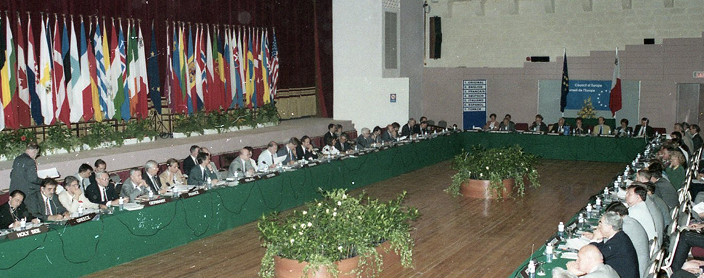 Malta hosts the 19th edition of the Conference of Ministers of Justice, dedicated to finding national and international responses to the cross-border problems of corruption. Ministers emphasised the critical role of the Council of Europe in combating corruption and underscored the need for a coordinated strategy involving collaboration with other international organisations.
Malta hosts the 19th edition of the Conference of Ministers of Justice, dedicated to finding national and international responses to the cross-border problems of corruption. Ministers emphasised the critical role of the Council of Europe in combating corruption and underscored the need for a coordinated strategy involving collaboration with other international organisations.
 Students from schools in Malta and Gozo gather in the capital city of Valletta to commemorate the 50th anniversary of the Council of Europe. The parade is a lively celebration, showcasing the organisation’s history and its significant impact on society, especially among the youth.
Students from schools in Malta and Gozo gather in the capital city of Valletta to commemorate the 50th anniversary of the Council of Europe. The parade is a lively celebration, showcasing the organisation’s history and its significant impact on society, especially among the youth.
Malta, along with the Republic of Ireland and the Swiss Confederation, becomes the first country to sign and ratify Protocol No. 13 to the Convention for the Protection of Human Rights and Fundamental Freedoms, abolishing the death penalty in all circumstances.
2002On the 15th of May, Malta presides over the 112th Session of the Committee of Ministers, which leads to the adoption of a Declaration reaffirming the fundamental importance of the European Convention on Human Rights.
2003 Malta enshrines sexual orientation and gender identity protections in its constitution and legally recognises same-sex partnerships for the first time. Months later, the 2016 Gender Identity, Gender Expression, and Sex Characteristics (GIGESC) Act establishes Malta as a global pioneer, highlighting its commitment to full LGBTIQ+ inclusion.
Malta enshrines sexual orientation and gender identity protections in its constitution and legally recognises same-sex partnerships for the first time. Months later, the 2016 Gender Identity, Gender Expression, and Sex Characteristics (GIGESC) Act establishes Malta as a global pioneer, highlighting its commitment to full LGBTIQ+ inclusion.
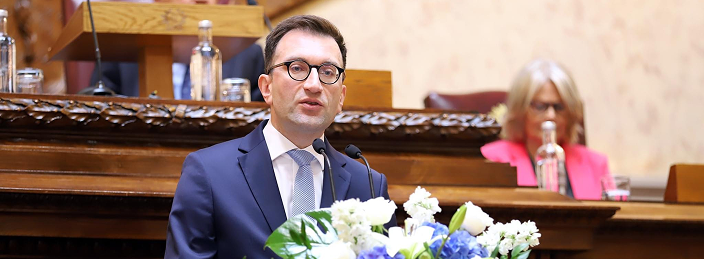 Under the leadership of former Ambassador. H.E. Lorenzo Vella, Malta is unanimously elected as Chair for a two-year term, reaffirming its dedication to foster a more equitable and just world through cooperation and mutual respect.
Under the leadership of former Ambassador. H.E. Lorenzo Vella, Malta is unanimously elected as Chair for a two-year term, reaffirming its dedication to foster a more equitable and just world through cooperation and mutual respect.
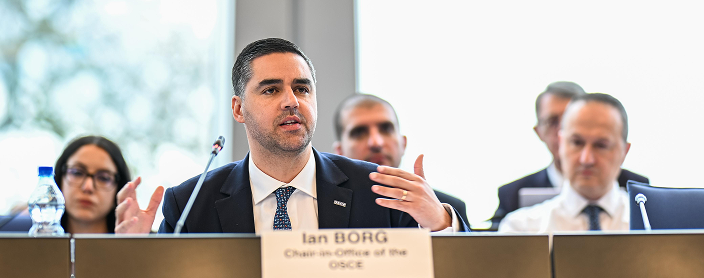 Hon. Ian Borg, Minister for Foreign and European Affairs and Trade, addresses the Committee of Ministers in Malta’s capacity as Chair-in-Office of the OSCE, highlighting both organisations’ role as the “beacons of stability and hope”.
Hon. Ian Borg, Minister for Foreign and European Affairs and Trade, addresses the Committee of Ministers in Malta’s capacity as Chair-in-Office of the OSCE, highlighting both organisations’ role as the “beacons of stability and hope”.
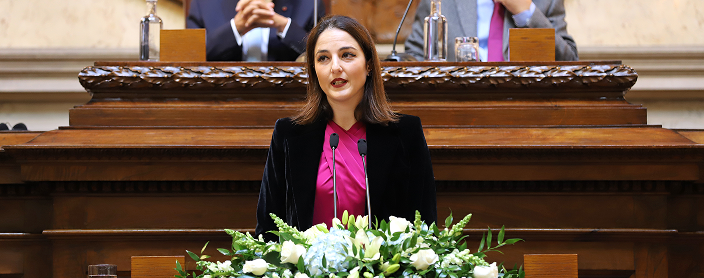 Malta, under the guidance of Ambassador Francesca Camilleri Vettiger, is unanimously elected as Chair of the North-South Centre for a second consecutive term, reinforcing youth engagement as a driving force for positive change.
Malta, under the guidance of Ambassador Francesca Camilleri Vettiger, is unanimously elected as Chair of the North-South Centre for a second consecutive term, reinforcing youth engagement as a driving force for positive change.
Sixty years after joining the Council of Europe, Malta is set to assume the Presidency once again, reaffirming its commitment to collaboration with Member States and partners. Together, they will work to promote a peaceful, equitable, and resilient world—one that celebrates diversity, champions equality, and empowers youth through dialogue, mutual respect, and shared understanding.
2025